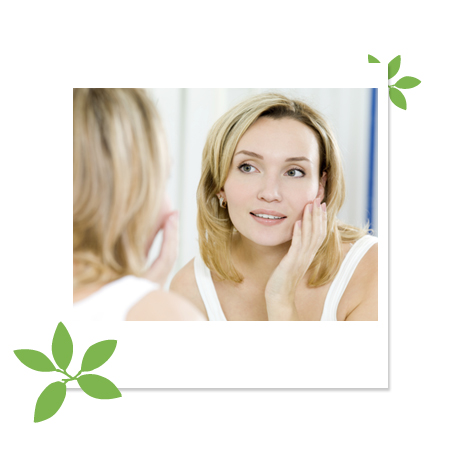Rosacea

Rosacea is a common skin disease affecting about 13 million Americans-one out of every 20 individuals. Redness, swelling, bumps, pimples, and even skin thickening are all symptoms of the condition, which most often occurs on the face, but can also affect the scalp, neck, ears, chest, back, and even the eyes, where it can cause grittiness, tearing, and burning. Rosacea usually strikes adults between the ages of 30 and 60, with women more often affected than men. The condition is typically more severe in men, however.
The redness of rosacea often starts out as a tendency to blush easily, then may get gradually worse over time until the redness is most always present. As it progresses, it can take on a sort of “mean” personality, flaring up in response to hot weather, stress, spicy foods, exercise, sun and wind exposure, alcohol, hot baths, and menopause. Doctors often separate the condition into stages or categories as follows:
- Prerosacea, which includes frequent episodes of flushing and redness of the face and neck.
- Vascular rosacea, where the redness becomes persistent and even permanent as a result of swelling of the blood vessels under the skin.
- Inflammatory rosacea, which creates bumps, pimples, and red lines on the face as a result of inflammation.
- Rhinophyma, or “advanced rosacea,” which creates the large, bulbous red nose.
What Causes Rosacea?
Like many skin conditions, scientists aren’t sure what causes rosacea, but research has found: it seems to run in families, it tends to be more prevalent in people over 30 years old with fair skin, blonde hair and blue eyes, typically those of Irish, Scottish, or northern European descent, it could be a result of a disorder in the blood-vessels or the immune-system, a certain kind of bacteria may be to blame, a type of mite that lives in hair follicles could have something to do with it.
So far, however, there is no definitive answer as to what causes the condition. It is a myth, for example, that alcohol causes it. Drinking can make the flushing worse, however, as can strenuous exercise, sunlight, emotional stress, and the other factors listed above.
Tips to Manage Rosacea
There is no cure for rosacea, but if you suspect you may have it, check with your doctor or dermatologist right away, as early diagnosis and treatment can help keep the condition from being visible or uncomfortable. You can also try these daily lifestyle habits to help reduce flare-ups and keep the condition from getting worse. (See our post All About Rosacea-with Tips for Managing It.)
- Avoid harsh and drying soaps and wash with moisturizing, nourishing cleansers that are fragrance-free and made without sulfates, drying alcohols, phthalates, or other toxic ingredients.
- Wash gently with lukewarm water, as hot water and harsh scrubbing can trigger flare-ups. Try to limit washings to only twice a day.
- Moisturize every day with a nourishing, fragrance-free formula. Consider those with soothing aloe and calming extracts like rose, and apply gently.
- Choose non-toxic, safe cosmetics, as the harsh ingredients in many cosmetics can irritate skin and worsen the condition.
- Use sunscreen every day, but choose a safe, non-chemical option like zinc oxide.
- Consider your diet-some people may experience rosacea as a result of food allergies. Check with your doctor and try eliminating some of the suspect foods and see if your condition improves.
- Avoid typical dietary triggers like hot beverages, spicy foods, alcohol, and large, hot meals.
- Practice regular relaxation and stress relief through exercise, meditation, yoga, and deep breathing, as these may help reduce flushing.
- Ask your doctor about B vitamins, as they are necessary for healthy skin, hair and nails.
- Try green tea soaks to the face-they may help decrease redness and inflammation, since green tea has natural anti-inflammatory properties.
- Consider zinc supplements, as some research has found that they help decrease rosacea symptoms.
- Get enough omega-3 fatty acids in your diet, as they naturally help to reduce inflammation.
- Topical or oral antibiotics prescribed by your doctor are often very helpful.
CV Skinlabs Products for You:
- Rescue + Relief Spray: helps calm, soothe and reduce redness. BUY NOW!
- Calming Moisture for Face, Neck & Scalp: instantly soothes and hydrates flushed skin, with oat extract to reduce redness and itch. BUY NOW!
Protect Your Skin, Protect Your Health
No matter what type of compromised skin you may have, you’re more at risk from exposure to toxic chemicals. Since most personal care products and cosmetics contain potentially harmful ingredients, it’s important to always read labels and use only safe, nurturing formulas that will enhance the condition of your skin. Click here for a list of Ingredients to Avoid in your personal care products.



